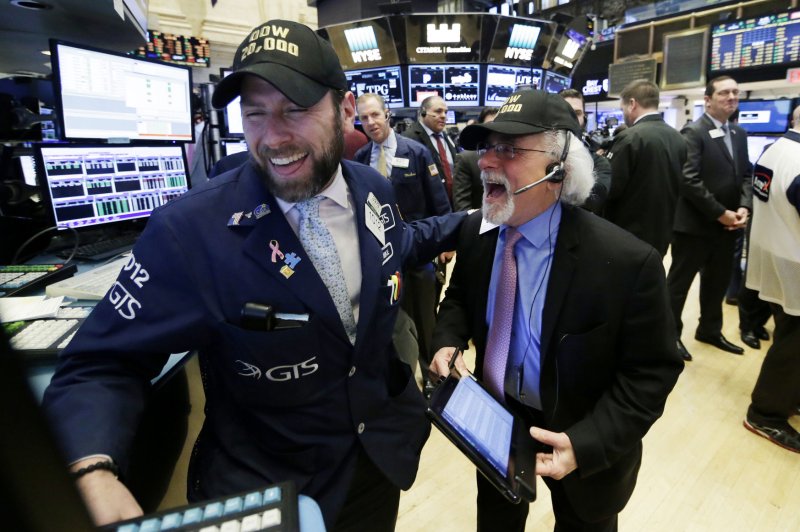1 of 2 | Traders wearing "Dow 20,000" hats work on the floor of the New York Stock Exchange on Wall Street in New York City in 2017, the day the Dow Jones Industrial Average crossed the 20,000 mark for the first time in history. File Photo by John Angelillo/UPI |
License Photo
Dec. 31 (UPI) -- For the first time in its history, the United States has gone a full decade without recording an economic recession.
The U.S. economy has expanded for a record 126 consecutive months, as of December, making the 2010s the first decade ever in which the United States has avoided meeting the definition of a recession, according to data from the National Bureau of Economic Research.
The NBER said the last U.S. recession -- known as the Great Recession -- spanned December 2007 to June 2009, at the height of the financial crisis, making it the longest of any such period since World War II.
The Great Recession resulted primarily from the collapse of the U.S. housing market and other financial institutions, which led the government to bail out most of the largest banks -- deeming them "too big to fail" -- and become more involved in investing and trading by placing tighter regulations.
Some economists theorize that the record period of ongoing expansion is a result of the government's response to the Great Recession, which included financial stimulus packages such as the Troubled Asset Relief Program and the Economic Recovery Act, which helped the domestic economy recover at a faster rate than usual.
"A very important reason why the United States has had such a long and very protracted expansion is that U.S. fiscal policy and monetary policy, being the Federal Reserve and politicians, were much quicker out of the box in terms of supporting the economy," Deutsche Bank Chief Economist Torsten Slok told CNBC.
Some experts acknowledge the record growth during the 2010s has been stable but not particularly substantial, in part due to consistent job growth and increases in Gross Domestic Product.
The Dow Jones Industrial Average crossed record thresholds in the 2010s -- 20,000 in early 2017, 25,000 in late 2017 and it's now approaching the 30,000 mark.
"There has been no recession because the growth rate of real GDP has been remarkably stable, although at a low average rate," Harvard economics professor Robert Barro said.
Despite the decade of growth, the U.S. economy has faced a few bumps in recent years -- including the largest single-day drop in the Dow Jones Industrial average since the financial crisis and ongoing uncertainty over the trade war with China, which Barro said increases the likelihoods of an economic downturn in 2020.
In mid-2019, some experts projected a recession -- perhaps before the end of the year, but continual job growth and strength in the stock markets significantly dampened those outlooks.















